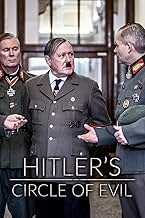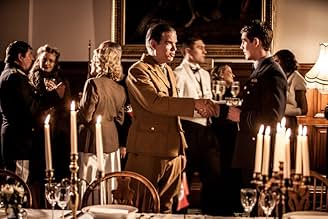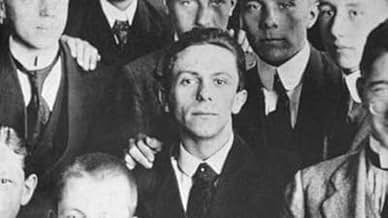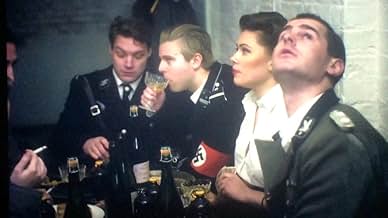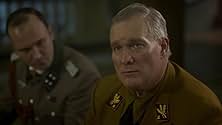CALIFICACIÓN DE IMDb
8.0/10
5.5 k
TU CALIFICACIÓN
La historia del ascenso y la caída del Tercer Reich contada a través de las relaciones personales de los miembros del Partido Nazi.La historia del ascenso y la caída del Tercer Reich contada a través de las relaciones personales de los miembros del Partido Nazi.La historia del ascenso y la caída del Tercer Reich contada a través de las relaciones personales de los miembros del Partido Nazi.
Explorar episodios
Opiniones destacadas
This is an excellent doc on the inner workings of the Nazi top tier of characters. The re-enactments are well done, some of the actors don't look anything like their real life counter-parts but I guess they took what actors they could. Tons of little seen and rare footage. The historians give a balanced account of these horrible men in-the-making rather than the standard they are totally evil repugnant creatures stance seen in more unbiased documentaries that only serve to distance and turn-off the viewer and possibly taint the lessons needed to be learned by the Nazi era. This doc could easily have been named "Absolute Power corrupts..."
Lovely presentation of historic facts. Beautifuly filmed. A source of knowledge of Second World War.
Better understanding of the roles of these terrible protagonists is the War
This excellent historian-narrated docu-drama retells the history of the making of the Nazi party and the Third Reich by focusing on the interplay of the main characters at the center of it all: Hitler and his inner circle of Nazi leaders. For me, the series rates very highly among many others in the genre for the seamless use of archival photos and footage, rich and convincing dramatization, and constant narrative driven commentary by numerous historians. The use of music to heighten the drama is not too intrusive, and is actually effective. One can forgive the British historians for their obvious bias in describing Hitler and his henchmen as "evil" and "deranged" because they were! Yet, it is important to take in the lessons the narrative also presents (with less obvious emotional force) in how Germany's economic ruin after WWI and the colonial ambitions of other European powers at that time abetted the drive toward the rabid nationalism that Hitler promoted... lessons that America had taken in far better than Britain and other Allies following WWII with the brilliant Marshall Plan. Back to this production, though: Even if you are well familiar with the history of the Nazi party, Hitler's Circle of Evil is fascinating and even entertaining viewing.
I just read Erik Larson's book "In the garden of beasts". The book tells you the story of William E. Dodd, american ambassador in Berlin from 1933 to 1937. Recommended! Combined with this series, it gives you a great view on what happened in Germany during that period, and we can only wonder why USA, GB and France didn't do something about it much earlier. They absolutely underestimated the situation. Hitler just wanted time to build his army.
William E. Dodd foresaw all this, and allthough he was criticized by many during that time because of what he said and wrote about what he thought would happen, he was later seen as a prophet they all should have listened to.
"Hitler's circle of evil" is an excellent documentary!
William E. Dodd foresaw all this, and allthough he was criticized by many during that time because of what he said and wrote about what he thought would happen, he was later seen as a prophet they all should have listened to.
"Hitler's circle of evil" is an excellent documentary!
I find the suggestions in some of the reviews that the Nazis were NOT irrational disturbing. There is one major argument to be made *for* their rationality: that the objectives of WWII were the same as WWI, and no one calls Kaiser and his crew irrational or nuts. On the other hand the military campaigns, in spite of the success against Poland and France, were nuts, as was the huge diversion of resources to the holocaust. Hitler's chief engineer Fritz Todt told him the Germans were going to lose in October 1941 and that he should negotiate a German withdrawal with Stalin. (whoops! sorry bout that!) But, even so, the series is explicit about the talents of some of these men: Goebbels was a capable orator, Goring seemed to have a better appreciation of grand strategy than most of the other party luminaries, Himmler had strong bureaucratic and organizational skills. They are really depicted as rational agents in thrall to an irrational ideology.
But what about the series? It is one of many possible ways to get into the vast and complicated topic that is WWII. The focus on domestic politics leaves out some important issues, such as the Soviet-German pact to divide Poland, but this series is not really about "total context." This series is about the personalities of the Nazi party. It helps you distinguish who was who, Goring from Goebbels, Himmler from Heydrich, Hesse, and so on. You don't get the generals. Just the major Nazi party figures.
If you watch this series with an extra resource, and every now and then pause the presentation to look up this or that, you will find it a useful way to get the feel of the Third Reich's major politicians. If you want a printed resource try the Oxford (single volume) encyclopedia of WWII. Or alternatively, take the time to use your tablet or phone to look up some of the topics that interest you on Wikipedia.
Almost any one of the WWII documentaries is *better*. For example, the famous "World at War" series from the 1970s. However, in that series, as you zip around battles and generals and politicians on both sides of the Atlantic and in Asia, you lose sight of the inner circle. The narrow focus of this series, in spite of its repetitive reality-show-ish format, is a very good first step into learning about the war and why these guys were hanged at Nuremberg (those that they could round up). As is often the case for such a complicated topic, every now and then something drops that I hadn't thought of, even though I have read a lot about WWII. For example, the series' argument that the plan to deport the Jews to Madagascar had to be shelved because the Germans lost the Battle of Britain (thus leaving the British with supremacy on the seas) was interesting. Very likely the Nazis would have gone ahead with extermination anyhow, but there are interconnections that I haven't made before. That Heydrich chaired the Wannsee conference was something else that had slipped my attention, even though I knew about the Wannsee conference. Goring's control of Prussia and its police/domestic espionage operation were news to me. The role of Martin Borman as a puppet master is also highlighted by the series, even though many treatments of the war tend to keep him in the background.
So all in all there's some good material in here. If this were the Michelin Guide I would give it a one star meaning "worth the trip." So I think this offers something to the WWII buff and it is also an interesting side trip if you find your regular viewing derailed by erratic shooting schedules. My main current series (such as Expanse, Babylon Berlin, and Game of Thrones) are all in suspension. If you like history and want to stream something that has a relatively short span from beginning to end this is a good option. The Germans lose WWII. Is that a spoiler?
But what about the series? It is one of many possible ways to get into the vast and complicated topic that is WWII. The focus on domestic politics leaves out some important issues, such as the Soviet-German pact to divide Poland, but this series is not really about "total context." This series is about the personalities of the Nazi party. It helps you distinguish who was who, Goring from Goebbels, Himmler from Heydrich, Hesse, and so on. You don't get the generals. Just the major Nazi party figures.
If you watch this series with an extra resource, and every now and then pause the presentation to look up this or that, you will find it a useful way to get the feel of the Third Reich's major politicians. If you want a printed resource try the Oxford (single volume) encyclopedia of WWII. Or alternatively, take the time to use your tablet or phone to look up some of the topics that interest you on Wikipedia.
Almost any one of the WWII documentaries is *better*. For example, the famous "World at War" series from the 1970s. However, in that series, as you zip around battles and generals and politicians on both sides of the Atlantic and in Asia, you lose sight of the inner circle. The narrow focus of this series, in spite of its repetitive reality-show-ish format, is a very good first step into learning about the war and why these guys were hanged at Nuremberg (those that they could round up). As is often the case for such a complicated topic, every now and then something drops that I hadn't thought of, even though I have read a lot about WWII. For example, the series' argument that the plan to deport the Jews to Madagascar had to be shelved because the Germans lost the Battle of Britain (thus leaving the British with supremacy on the seas) was interesting. Very likely the Nazis would have gone ahead with extermination anyhow, but there are interconnections that I haven't made before. That Heydrich chaired the Wannsee conference was something else that had slipped my attention, even though I knew about the Wannsee conference. Goring's control of Prussia and its police/domestic espionage operation were news to me. The role of Martin Borman as a puppet master is also highlighted by the series, even though many treatments of the war tend to keep him in the background.
So all in all there's some good material in here. If this were the Michelin Guide I would give it a one star meaning "worth the trip." So I think this offers something to the WWII buff and it is also an interesting side trip if you find your regular viewing derailed by erratic shooting schedules. My main current series (such as Expanse, Babylon Berlin, and Game of Thrones) are all in suspension. If you like history and want to stream something that has a relatively short span from beginning to end this is a good option. The Germans lose WWII. Is that a spoiler?
Selecciones populares
Inicia sesión para calificar y agrega a la lista de videos para obtener recomendaciones personalizadas
- How many seasons does Hitler's Circle of Evil have?Con tecnología de Alexa
Detalles
- Tiempo de ejecución50 minutos
- Color
- Relación de aspecto
- 16:9 HD
Contribuir a esta página
Sugiere una edición o agrega el contenido que falta

Principales brechas de datos
What is the Canadian French language plot outline for Hitler's Circle of Evil (2018)?
Responda

